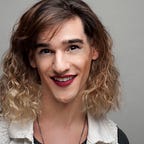Let’s Talk Privilege | Dear Baby Maybe #27
--
Dear Baby Maybe,
People contain complexities. People can contradict themselves. People can’t only be one thing their whole lives. That’s not how people work. As you grow into yourself, you’ll find that people have certain expectations for you based on how you are perceived. I break through those expectations and challenge assumptions every day by not fitting into the boxes people have given me.
People can be categorized as good or bad, but they do not need to be exclusively one or the other. Destroy every binary, right? “Good” and “bad” are subjective, and based on who’s judging. Someone who is typically known to you as a “good person” can mess up and do something you’ll deem bad. Likewise, someone who you’ve thought of as a “bad person” can surprise you with a good deed. The idea of people existing on this spectrum of good and bad is also rooted in who these people are: how they exist and amongst whom they exist. Most people have been trained to let a certain type of person default to “good,” where others fall into categories like “bad.”
A lot of people don’t like to talk about privilege, and that’s often because they’re uncomfortable acknowledging that they have it.
The phenomenon I’m talking about here is privilege; the world’s willingness to grant certain people advantages, or see people as “good” or “bad” based on who they are. A lot of people don’t like to talk about privilege, and that’s often because they’re uncomfortable acknowledging that they have it. The fact of the matter is, to varying degrees, every person has some privileges. There is privilege based on race and ethnicity, gender identity and presentation, sexuality and orientation. There are privileges based on physical ability and mobility, the size of a person’s body, how conventionally attractive a person is, intellectual or developmental differences, medical status, access to money. The list can go on and on, and can look different for different people.
See, privilege is not actually a thing we have much control over. There are some cases where people can make accommodations in order to gain access and safety, but for the most part your level of privilege is out of your control. Privilege is given to you by the world around you. Your privilege is taught to you through how the world sees you. People often assume men to be more capable than women for certain jobs. People are often willing to forgive white people for crimes that have gotten people of color incarcerated. There are examples almost anywhere you go, from small day to day interactions to systems and institutions that are built to keep certain folks from succeeding.
An important thing for me to highlight here is that we are heavily privileged. As a queer person, it is easy to get wrapped up in what makes us different from the norm, and that pressure is largely put on us from the outside. I see a lot of people like us often bogged down by the discrimination we face and unwilling or unable to see the full picture. In recent years I have thought about the above list of privileges that one can hold, and realized that being queer is the only thing that holds me from privilege. As a white, able-bodied, thin, conventionally attractive, neurotypical person who grew up in the upper-middle class, we have to acknowledge and address the position all of those privileges puts us in. Furthermore, we have to consider how those privileges intersect with our queerness and protect us from the discrimination we’d face because of it.
I quickly realized that we actually benefit from intersectionality.
The conversation that led me to this realization is rooted in Kimberlé Crenshaw’s coining of the term Intersectionality. See, intersectionality refers to the connection between all of the different identities a person can hold that can put them at social disadvantages. So for example, the idea that a black trans woman is not just at a disadvantage for belonging to one marginalized category, but the intersections of those multiple identities leave a person at an even greater risk of discrimination. In considering this framework for thinking about identities, I quickly realized that we actually benefit from intersectionality. The way our body moves in spaces, the color of our skin, and several other factors of our privileges actually help to cushion the discrimination we’d face if we held another marginalized identity. As we’ve discussed before, specifically living in New York City at the time I do, I very rarely find myself in a situation where I feel directly unsafe or targeted.
So we’re going to talk about privilege. Because as you grow up and learn about the world around you, you will be surrounded by people who aren’t talking about it. And you’re going to grow into what a lot of people might call a “bad” person before you get to the point where I’m at. But that’s largely rooted in your inability to acknowledge your own privileges along the way. And when you’re not aware of privilege, you can be unaware of how they are negatively impacting those around you. So let’s talk privilege. More soon.
Your Future,
Maybz
